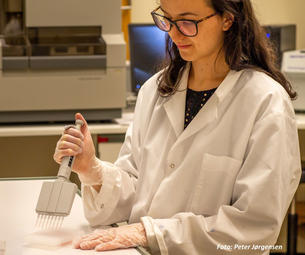Summary:
 Most of us, if not all, have noticed that some people are more physically active than others. Also, some are better at some kind of sports or exercise, but less so – at other types. Why is it so? Is it nature, or is it nurture? We, humans, are more than 99% genetically identical to each other meaning that under than 1% of our DNA sequence contribute to the differences between us.
Most of us, if not all, have noticed that some people are more physically active than others. Also, some are better at some kind of sports or exercise, but less so – at other types. Why is it so? Is it nature, or is it nurture? We, humans, are more than 99% genetically identical to each other meaning that under than 1% of our DNA sequence contribute to the differences between us.
Physical activity levels, muscle strength as well as athletic performance are complex traits that are determined by many factors, including genetics, age and gender. Through two different projects, Sannija Goleva-Fjellet and colleagues investigated what role several common genetic variants, age and gender play in determining physical activity levels, and muscle strength and its trainability among the general population. In one of the projects, the “Leg-press” study, participants aged 20 to 70 and above took part in an 8-week maximal strength-training intervention using the leg-press machine. In the third project, well-trained cross-country skiers were followed and tested over 6 months. The aim was to study how training, gender, age and selected genetic variants influenced a number of physiological and endurance performance variables.
The results showed that genetic variants appear to play a role in determining the physical activity levels as well as muscle strength in the general population. Also, several of the genetic variants likely influenced several of the measured strength and endurance variables among the cross-country skiers. It was also found that, unsurprisingly, age and gender had an impact on both maximal strength and endurance performance. However, age or gender did not seem to impact the trainability of maximal strength or endurance. An important take-home message from the “Leg-press” study is that maximal strength training is an effective way to counteract the age-related decline in muscle strength, and can therefore be recommended to individuals of all ages.
